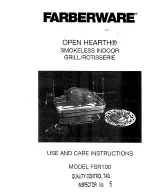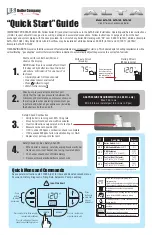
104
SYSTEM MANAGER
MODBUS CONNECTION
8
MODBUS CONNECTION
The thermal mode is equipped with a Modbus connection
(based on the RS485 communication standard) that supports
the remote management and adjustment of the aforemen-
tioned thermal module.
The Modbus connection is available in the low-voltage terminal
board.
MO1
BUS 1
SB
Modbus
0-10V
TA
1
2
3
4
9 10 11
5 6 7 8
A
B
Configuration
The following table shows the connection details.
Protocol
Modbus RTU
Slave address
Adjustable from the display.
Default: 1
Supported Modbus controls
Read Holding registers (03)
Write single holding register
(06) Write multiple holding
registers (10)
Baud rate
9600 bps.
Length
8
Parity
No
Stop Bits
1 or 2 (adjustable from PB or
PC software)
Connection
RS485 (2 wires + optional
earthing)
As shown in the table above, the thermal module's address
(meant as the address of the slave device in the Modbus system)
and the number of "Stop Bits" are two adjustable values.
To modify one or the other, from the home screen, access the
"Settings" menu, select "General settings" and confirm.
“
Settings
”
“
General Settings
”
“
Boiler Settings
”
Access the "Other settings" menu and select "Ind. Modbus"
“
Other Settings
”
“
Modbus Address
”
1
“
Modbus Stopbits
”
2
“
Startup Settings
”
Registers
Depending on the type of Modbus device used to connect to
the thermal module, the registers' addressing may start from
0x0000 or 0x0001.
If addressing starts from 0x0000, the numbers of the registers
listed in the table below may be used directly for reading/writ-
ing operations; if addressing starts from 0x0001, the numbers of
registers shown in the table, plus one, must be used for read-
ing/writing operations.
Control register
The control register is used for special functions.
The first one is that of enabling writing on registers. All accessi-
ble registers, including write ones, must be first enabled to re-
ceive data. To prevent undesired entries, it is possible to change
the value in a register only during the first four seconds after the
status change of the 0 bit in the control register.
Therefore, before changing the value of a register, it is necessary
to change the status of 0 bit of the control register (register No.
99), sending the string 1 to it.
The control register also supports the remote resetting of the
board, by changing the status of the 14 bit. Therefore, by send-
ing the value 16384 to register No. 99, it is possible to reset the
board.
9
By sending a value other than 1 and from 16384 to register
No. 99, the latter will return to the write-protected status
(bit 0=0).
The table that summarises the control register's operation is
provided below:
Register
number
Access
Description
Value range
L
S
99
0063 X
X
Control register
Bit 0: enables
writing
Bit 14: controller
reset
Measurement unit selection register
Register 98 is used to change the format of the data stored in
registers (those containing temperature or pressure values).
Before changing the value of the selection register, it is neces-
sary to enable it for writing by forwarding the enabling com-
mand to the 99 control register.
The table for measurement unit selection register is the follow-
ing:
Register
number
Access
Description
Value range
L
S
98
0062 X
X
Measurement
unit selection
register
Bit 0: °C/°F
Bit 1: bar/psi
Types of data
Type of data
Unit
Temperature
°C/°F
Voltage
Volt
Pressure
bar/psi
Ionisation current
μA
Percentage
%
Connection
RS485 (2 wires + optional
earthing)









































